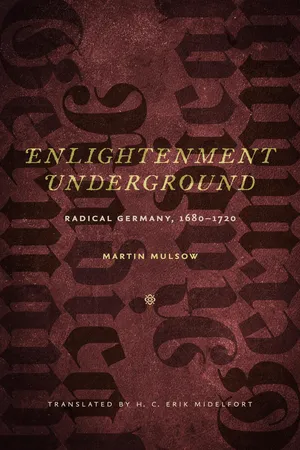
- 464 pages
- English
- ePUB (mobile friendly)
- Available on iOS & Android
About this book
Online supplement,"Mulsow: Additions to Notes drawn from the 2002 edition of Moderne aus dem Untergrund": full versions of nearly 300 notes that were truncated in the print edition. Hosted on H. C. Erik Midelfort's website.
Martin Mulsow's seismic reinterpretation of the origins of the Enlightenment in Germany won awards and renown in its original German edition, and now H. C. Erik Midelfort's translation makes this sensational book available to English-speaking readers. In Enlightenment Underground, Mulsow shows that even in the late seventeenth century some thinkers in Germany ventured to express extremely dangerous ideas, but did so as part of a secret underground. Scouring manuscript collections across northern Europe, Mulsow studied the writings of countless hitherto unknown radical jurists, theologians, historians, and dissident students who pushed for the secularization of legal, political, social, and religious knowledge. Often their works circulated in manuscript, anonymously, or as clandestinely published books.
Working as a philosophical microhistorian, Mulsow has discovered the identities of several covert radicals and linked them to circles of young German scholars, many of whom were connected with the vibrant radical cultures of the Netherlands, England, and Denmark. The author reveals how radical ideas and contributions to intellectual doubt came from Socinians and Jews, church historians and biblical scholars, political theorists, and unemployed university students. He shows that misreadings of humorous or ironic works sometimes gave rise to unintended skeptical thoughts or corrosively political interpretations of Christianity. This landmark book overturns stereotypical views of the early Enlightenment in Germany as cautious, conservative, and moderate, and replaces them with a new portrait that reveals a movement far more radical, unintended, and puzzling than previously suspected.
Frequently asked questions
- Essential is ideal for learners and professionals who enjoy exploring a wide range of subjects. Access the Essential Library with 800,000+ trusted titles and best-sellers across business, personal growth, and the humanities. Includes unlimited reading time and Standard Read Aloud voice.
- Complete: Perfect for advanced learners and researchers needing full, unrestricted access. Unlock 1.4M+ books across hundreds of subjects, including academic and specialized titles. The Complete Plan also includes advanced features like Premium Read Aloud and Research Assistant.
Please note we cannot support devices running on iOS 13 and Android 7 or earlier. Learn more about using the app.
Information
Table of contents
- Cover Page
- Title Page
- Copyright
- Contents
- Translator’s Note
- Author’s Preliminary Note and Acknowledgments
- Introduction: Radicalism as a Problem for Research
- One: The Ambivalence of Scholars
- Two: The Socinian Enlightenment
- Three: Atheism at the Heart of Orthodoxy?
- Four: Political Theology
- Five: The Destruction of Christian Platonism
- Six: Gundling versus Budde
- Seven: Eclecticism and Indifferentism
- Conclusion
- Notes
- Bibliography
- Index